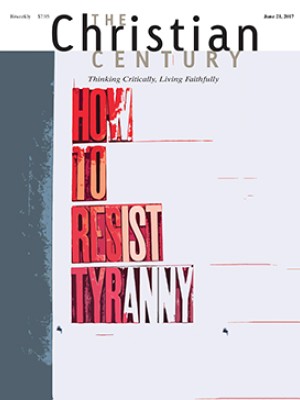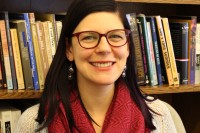Prolific ecumenical storyteller and poet dies at age 60
“Stories are food,” Brian Doyle said. Without them, talk is “all sales pitches and lies.”

Brian Doyle, an author and poet whose work frequently appeared in the Christian Century and other faith-based publications, died May 27 at his home in Lake Oswego, Oregon, at age 60. He had been diagnosed with brain cancer in November.
For 25 years he edited Portland magazine at the University of Portland, a Catholic school. The magazine has been ranked among the best university publications, and author Annie Dillard called it “the best spiritual magazine in the country.”
Read our latest issue or browse back issues.
“Brian exemplified God’s grace by how he lived his life,” said Mark L. Poorman, the university president, in a statement. “He was a man filled with a sense of humanity and wonder, who was interested in everyone’s story and who saw everyone’s potential.”
Doyle wrote more than two dozen books of fiction, essays, and poetry.
“I’ll never write a millionth of the things I should have,” Doyle said, while giving the Century’s annual lecture in November 2015, a year before his diagnosis.
Addressing the gathering, he described growing up in an Irish American family, with his grandparents speaking Gaelic. He strove to “write the way people talk.”
“Stories are food,” he said. Without them, talk is “all sales pitches and lies.”
He called Matthew 25 “the greatest mission statement of all time.” In a 2014 essay in the Century, “Notes on loving your neighbor,” he wrote that “if the mysterious Word is alive in every heart, then he was in some chamber of even bin Laden’s, and Hitler’s, and Mao’s, and Stalin’s, and Pol Pot’s—the endless parade of thugs that fill our newspapers and smartphones and history with their shrill crowing lies.” Christianity is about knowing that such criminals “are your brothers and you are not at all unlike them, with murderous splinters in your own heart. It is about being honest, or at least trying to be.”
In a 2016 essay about his sixth-grade teacher, he called it “a miracle” the way stories cause events from years ago to become present to authors and readers.
“We think that time is a very shadow that passeth away and flees from us except in faint and fading memory, but I deny this, I deny it adamantly,” he wrote. “Everything that happened is happening then and now. How this can be I do not know, yet it is so, and it is holy and terrible.”
Another such moment he retrieved from the past was his first conversation with a Protestant, one who, like Doyle’s father, was a journalist engaged in ecumenical work. Within the eight-year-old Doyle’s hearing, the two men expressed hope for the church to be united in doing the work Jesus has commanded.
“I am older now than they were then and the walls among the Christian traditions have still not crumbled, for any number of silly reasons—mostly having to do with lethargy and money and paranoia,” Doyle wrote in 2013. “But sometimes I still wonder what it would be like if they did crumble suddenly somehow, and the two billion Christians on earth stood hand in hand, for the first time ever, insisting on mercy and justice and humility and generosity as the real way of the world. You would think that two billion people insisting on something might actually make that thing happen, wouldn’t you?” —the Christian Century
For a tribute to Doyle, see “Brian Doyle's ferocious attention.”






